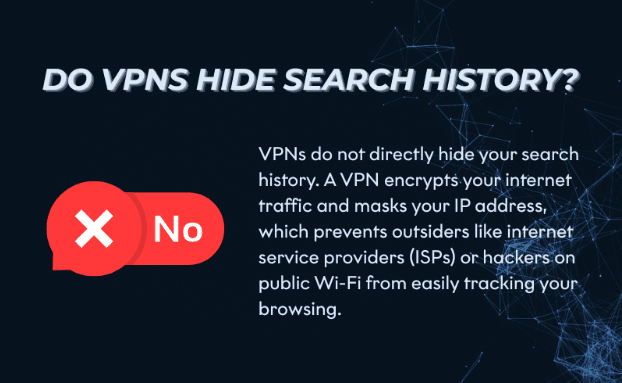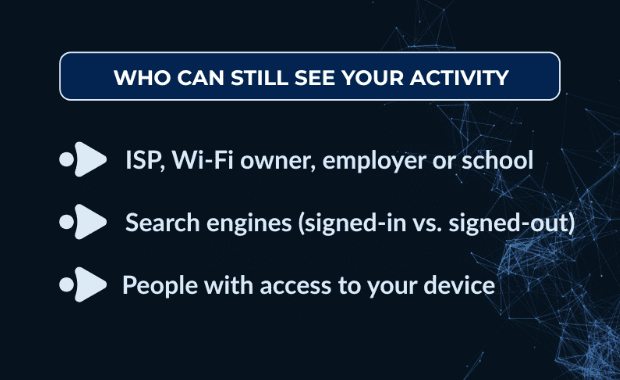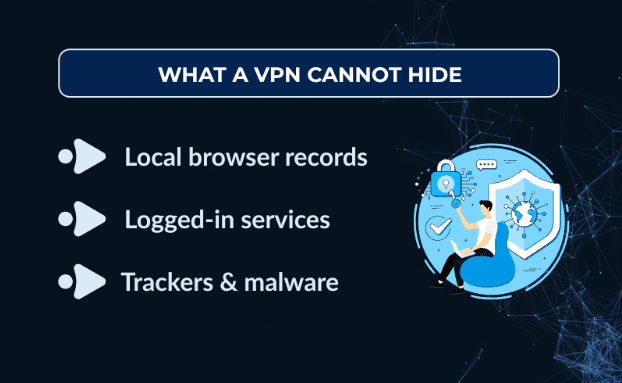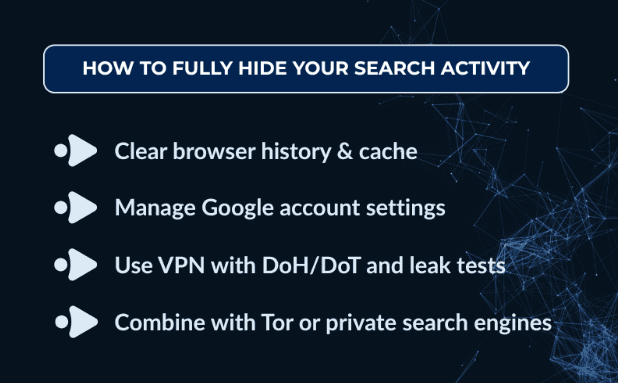When I first connected my laptop to free Wi-Fi at an airport, I assumed using a VPN would completely erase my search history. Later, I learned that while VPNs do protect traffic from prying eyes, they don’t automatically make your search history invisible everywhere. This article explains the real answer to “Do VPNs hide search history?” and what you can do to stay private online.
Here’s what you’ll learn:
- Whether VPNs actually hide your search history
- How VPN encryption works in practice
- Who can still see your activity despite using a VPN
- Practical steps to protect your browsing privacy
Let’s begin with the quick answer.
1. Quick answer: Do VPNs hide search history?
Do VPNs hide search history? The short answer is no. VPNs do not directly hide your search history. A VPN encrypts your internet traffic and masks your IP address, which prevents outsiders like internet service providers (ISPs) or hackers on public Wi-Fi from easily tracking your browsing.
Quick answer: Do VPNs hide search history?
However, the actual search queries you type into Google, Bing, or any other search engine can still be logged if you are signed in to an account or if the service tracks users through cookies.
According to CISA (2024), a VPN should be seen as a tool to secure connections and reduce exposure on untrusted networks, not as a guaranteed way to erase all online activity.
In other words, while a VPN raises the bar for privacy, your search history can still be collected by:
- The search engine you use
- Websites you visit while logged in
- Local records on your device
If your goal is full search privacy, you need to combine a VPN with additional measures like clearing your browser history, adjusting Google account settings, or using private search engines.
2. How VPNs actually work
A VPN is not a magic eraser for your online footprint. Instead, it acts as a secure tunnel between your device and the internet. If you’re new to this technology, you can first read our full guide on what is a VPN to understand the basics before diving deeper into privacy questions like “Do VPNs hide search history?”.
2.1. Device to VPN encryption
When you connect to a VPN, all the traffic leaving your device is encrypted before it reaches your internet service provider.
For example, if I tested NordVPN on hotel Wi-Fi, the network owner could only see that I was connected to a VPN server, not which websites I visited. This is why VPNs are strongly recommended for public Wi-Fi safety.
2.2. What ISPs can still see
Although ISPs cannot read the contents of your encrypted traffic, they can still detect some details. According to Safelyo’s VPN review (2025), providers can usually see:
- That you are connected to a VPN
- The amount of data being transferred
- The VPN server’s destination IP
This means ISPs can’t log your exact browsing history, but they know you are using a VPN connection.
2.3. Limitations after the VPN server
Once your traffic exits the VPN server, it is decrypted and sent to the website you want to visit. From that point onward, the destination website or search engine can still record your actions.
For example, if you search Google while logged in to your account, Google will still log those searches even if you used a VPN.
3. Who can still see your activity
Even with a VPN active, certain parties can still access or infer parts of your activity. Knowing who they are helps set realistic expectations for privacy.
3.1. ISP, Wi-Fi owner, employer or school
Your ISP cannot see your exact browsing history, but it does know you are connected to a VPN and how much data you use.
Similarly, a Wi-Fi hotspot owner (like a café or airport) can see that your device is connected, though they cannot inspect the contents. Employers or schools that manage networks may also monitor connection logs, and some even restrict VPN usage.
3.2. Search engines (signed-in vs. signed-out)
If you are signed in to Google or Bing, your search queries are tied to your account. Even when signed out, these companies can still track activity by using cookies, your IP address, and browser fingerprinting.
As Wired highlighted in a 2023 privacy report, VPNs cannot block search engines from collecting data once you interact with their platforms.
3.3. People with access to your device
Anyone with direct access to your phone, tablet, or computer can still view your local browsing history. For example, a shared family computer or work laptop may keep records unless you clear your browser cache or use private browsing.
Who can still see your activity
4. VPN vs private browsing
Many people confuse VPNs with private or incognito browsing, but they solve different privacy problems. A VPN encrypts your internet traffic and hides your IP address from outsiders, while private browsing only prevents your browser from saving local history, cookies, and form data.
For example, if you open Chrome in incognito mode, your ISP and search engine can still track your activity. If you use only a VPN, your local browser will still save history unless you clear it. For stronger privacy, you may want to combine both tools: use a VPN to secure traffic and private browsing to reduce local traces.
5. Google account and search tracking
Even if you connect through a VPN, Google can still log your searches if you are signed in. This is because the tracking happens at the account level, not the network level. That’s why when people ask, “Do VPNs hide search history from Google?”, the answer is no, your activity can still be tied to your Google profile.
5.1. Web & App Activity
By default, Google stores your searches, location history, and activity across devices under a feature called Web & App Activity. If this is turned on, your queries are linked to your account and synced across devices, regardless of whether you used a VPN.
5.2. Reducing Google tracking
You can limit this by:
- Pausing or disabling Web & App Activity in your Google Account settings
- Using guest mode or logging out of your account when searching
- Switching to private search engines like DuckDuckGo or Startpage for anonymous queries
According to the Electronic Frontier Foundation (EFF, 2023), combining VPN usage with privacy-focused search engines significantly reduces data trails, especially when you avoid logging into an account.
6. What a VPN cannot hide
Even with a VPN active, there are still several areas where your privacy can be exposed. Recognizing these limits ensures you use the right mix of tools to stay safe.
6.1. Local browser records
Your browser continues to save information such as visited sites, cached files, and cookies. Unless you clear these manually or use private browsing, anyone with access to your device can still view this data.
6.2. Logged-in services
When you sign in to platforms like Google, Facebook, or Amazon, your activity is tied directly to your account. A VPN does not prevent this kind of tracking because the data is linked to your login credentials, not your IP address.
6.3. Trackers & malware
Websites often use tracking scripts, ads, and fingerprinting to follow users across the internet. Additionally, malware on your device can record keystrokes or steal browsing data regardless of VPN protection. To address this, you should pair a VPN with anti-malware software and privacy-focused browser tools.
What a VPN cannot hide
7. How to fully hide your search activity
A VPN is a strong first step, but it does not guarantee complete anonymity. To truly protect your search activity, you need to address local device records, account-level tracking, and hidden leaks. The following methods, when combined, provide a much stronger layer of privacy.
7.1. Clear browser history & cache
Your browser automatically records visited pages, cookies, and cached files. These can reveal your habits to anyone with access to your device. To reduce this risk:
- Open your browser settings and manually delete browsing data on a regular basis.
- Enable “clear history on exit” so everything resets each time you close the browser.
- Consider using private browsing or incognito mode to avoid saving history in the first place.
This step is especially important on shared devices, such as family computers or work laptops.
For example, here’s a step-by-step guide on how to clear search on iPhone if you want to remove stored queries on mobile.
7.2. Manage Google account settings
If you are signed in to Google, your searches are linked directly to your profile. Disabling this is essential for search privacy:
- Visit Google Account > Data & privacy > Web & App Activity.
- Pause or delete activity history to stop automatic logging.
- Turn off personalized ads, which also rely on your search behavior.
When I tested this on my own account, I noticed that previously stored searches disappeared from the activity dashboard once I paused the setting.
7.3. Use VPN with DoH/DoT and leak tests
A VPN encrypts your traffic, but DNS requests may still leak if not properly configured. To avoid this:
- Enable DNS-over-HTTPS (DoH) or DNS-over-TLS (DoT) in your browser or system settings.
- Run online leak tests (DNS, IP, WebRTC) to confirm that only your VPN server is visible.
- Switch VPN providers if your current one frequently fails these tests.
This is a step many users forget, but it ensures your ISP or third parties cannot track websites you request through DNS queries.
7.4. Combine with Tor or private search engines
To go beyond VPN protection:
- Use Tor Browser for highly sensitive searches. Tor routes your traffic through multiple nodes, making it extremely difficult to trace.
- Rely on private search engines like DuckDuckGo, Startpage, or Qwant. These services do not log your queries or tie them to your account.
When paired with a VPN, this layered approach makes it nearly impossible for one entity to connect your searches back to you.
How to fully hide your search activity
8. Choosing the right VPN for privacy
Not all VPNs offer the same level of protection. Some focus on speed or streaming, while others are built with strict privacy in mind. If your goal is to hide your search activity as much as possible, choosing a VPN with proven trustworthiness and strong features is essential.
8.1. Verified no-logs policy
A reliable VPN should operate under a no-logs policy, meaning it does not store records of your browsing or search activity. Look for providers that have undergone independent audits to confirm these claims. For example, Surfshark and NordVPN both published third-party audit reports in 2023 that verified their no-logs policies.
8.2. Jurisdiction & audits
The country where a VPN company is based determines whether it can be legally compelled to share user data. Privacy-friendly jurisdictions, such as Panama or the British Virgin Islands, offer stronger protections than countries with mandatory data retention laws. Always check whether your provider has published external audits for transparency.
8.3. Advanced features (kill switch, own DNS)
Beyond encryption, a strong privacy VPN should include:
- Kill switch: Automatically cuts internet access if the VPN disconnects, preventing accidental leaks.
- Private DNS servers: Ensures your DNS queries are handled securely without going through your ISP.
- Leak protection: Shields against IP, DNS, and WebRTC leaks that can expose your activity.
When I tested VPNs on public Wi-Fi, the kill switch feature proved especially useful. A brief disconnect happened, but the kill switch prevented my real IP from leaking until the VPN reconnected.
9. FAQs about Do VPNs hide search history
Even after understanding how VPNs work, many people still have practical questions about search privacy. Here are some of the most common ones.
9.1. Can my ISP see my search history if I use a VPN?
No, your ISP cannot see your exact search history when you use a VPN. They can only see that you are connected to a VPN server and the amount of data being transferred, but not the websites or search terms you use.
9.2. Does incognito mode hide search history from Google?
No, incognito or private browsing only hides activity from your local device, such as not saving cookies or history. Google and other search engines can still log your searches if you are signed in or if they track you with cookies or fingerprinting.
9.3. Can my employer or school see what I search if I use a VPN?
If you connect to a VPN, your employer or school cannot see your detailed browsing history. However, they may detect that a VPN is being used, and some organizations block or restrict VPN traffic.
10. Conclusion
So, do VPNs hide search history? The answer is no. A VPN hides your IP address and encrypts your traffic, which keeps outsiders like ISPs and Wi-Fi owners from viewing your activity. However, your search history can still be logged by search engines, websites you log into, and your own browser unless you take further steps.
Key takeaways from this guide:
- VPNs protect network-level privacy but do not erase account-based or local records.
- Google and other services can still log searches if you are signed in.
- Clearing browser data, managing account settings, and running leak tests are essential for stronger privacy.
- Combining a VPN with private search engines, Tor, or additional security tools gives you the highest level of protection.
From my own experience, using a VPN on public Wi-Fi stopped network snooping, but I still saw my Google account saving searches until I adjusted settings and used DuckDuckGo for sensitive queries. That’s when I truly noticed the difference.
If you want to strengthen your online privacy further, explore more step-by-step tutorials in Safelyo’s Privacy & Security Basics section, where we break down VPN, antivirus, and security tools in simple terms.
Contact information:
- Website: https://safelyo.com/
- Office address: 4/567 Group 10 Hoa Lan 1 Residential Area Thuan An, Binh Duong, Viet Nam
- Email: info@safelyo.com
- Fanpage: https://www.facebook.com/safelyoglobal
- YouTube: https://www.youtube.com/@Safelyo
- Office hours: Monday – Friday: 9:00 AM – 5:00 PM (GMT+7)

































